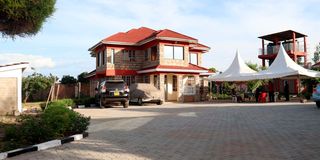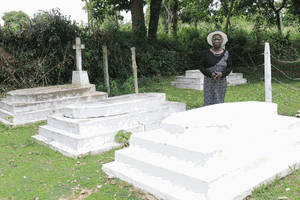
The homestead of former senior civil servant Naftali Onderi Ontweka in Kamulu, Machakos County on Friday. The Court of Appeal, in its verdict on January 25, allowed his wife, Zipporah Masese Onderi, to be given the body for burial in Machakos.
Zipporah Masese Onderi would never wish for any widow to go through what she has faced since her husband died last year.
The body of her husband, Naftali Onderi Ontweka, has been lying at the Lee Funeral Home since his death on April 19, 2023.
Between then and now, three courts have heard and determined a case regarding where his remains should be buried. The question has been: “Should the interment be in Kiango, Kisii County — his ancestral home — or in Kamulu, Machakos County, where he bought land and built a palatial home?”
“I wish no other woman goes through a problem like this. It’s tough,” Zipporah told the Sunday Nation on Friday. “Even the people who were allies previously now turn against you. You are left with your children and God. So, you keep on praying and saying, ‘God, I know you are ahead of us. Don’t leave us.’”
Also Read: Why burial clause is crucial in Wills
The outcome of the case in the three courts has been what one would call a 2-1 win for Zipporah. Two courts — the Court of Appeal and the High Court — have chosen Kamulu because that is where the widow and her four children prefer. However, the magistrate’s court in Nairobi — the first court to hear the case before it went up the appeal channel — had directed that the body be buried in Kisii.

Naftali with his wife Zipporah during a past event.
The two upper courts chose to amplify the Constitution and the weight it places on the family as the basic unit of society. Using that provision, they explained that the nuclear family holds the greatest sway in such matters.
On the other hand, the magistrate’s court opined that because Mr Onderi had largely operated in line with his culture, for instance by holding a customary marriage in 1980, then he was bound to be buried using the cultural practices that tend to favour the ancestral home as the burial site. Furthermore, the magistrate noted, Mr Onderi never professed the Christian faith despite having been baptised.
After a January 25 verdict by a three-judge bench of the Court of Appeal that discarded that observation by the magistrate, the matter is all but settled. Mr Onderi’s remains will be buried in his five-acre property in Kamulu.
The widow and her children say they are welcoming everyone, even those who disputed the burial, to give their last respects.
Also Read: Wambui Otieno's grave stirs old rivalries
“The gates are open. People can come and participate, in whichever way they deem fit, because everyone is mourning in their own way,” said Boniface Gwaka, the eldest child in the Onderi household.
Zipporah believes Mr Onderi will be happy that his final resting place will be in the Kamulu property, a space he loved to till.
“He would wake up at 6am and go to the farm, tending after vegetables and fruits. You’d see him toiling with the pipes, and carrying manure from the cows. When done, there was a stone in the compound where he would come, take off his gumboots, wear slippers then ask for something to drink,” she told the “Sunday Nation”.
Another family tradition she fondly recalled is the fact that whenever Mr Onderi entered the house and any of his children were present, the children would stand up to recognise his entry. It always amused him, she said, and he would always ask them why they had to stand up.
Haron Okindo, the second born, described Mr Onderi as a hands-on father.

Naftali Onderi Ontweka.
“He basically made me the person I am. He never failed to intervene whenever he saw me going astray,” he said. “All the property I own is because he showed me the way.”
In court, Zipporah said the Kamulu residence is the matrimonial home where Mr Onderi held occasional celebrations with relatives.
The family also has a home in Kileleshwa, Nairobi. Mr Onderi used to be a senior civil servant working with the National Treasury. In the 2022 General Election, he vied for the Bomachoge Borabu parliamentary seat, a race that was won by Obadiah Barongo.
This is a case where family won over traditions. As more and more Kenyans buy land away from home to settle, this is a case that families wrangling over the site of burial of a loved one will cite for years to come.
In court, one of the witnesses conceded that members of the Gusii community “have indeed moved, settled and have been buried in several parts of the country”.
It is a case that cemented a growing line of argument in the courts that there is a hierarchy as to whose word bears the most weight regarding the burial of a person. That hierarchy, set by a ruling of the Court of Appeal in 2020, says this is the order; spouse, children, parents, and, lastly siblings.
Consequently, the dispute about the burial of Mr Onderi, which had his widow on one side and his four brothers on another, was technically a showdown between the first in the hierarchy versus the fourth. Zipporah was bound to win.
“The 2010 Constitution changed everything,” said Haron. “Anything, be it cultural law or whatever, if it conflicts with anything on family, that cultural law is declared null.”
This was also a case that amplified one of the burial traditions among the Abagusii — the need for two doors in a man’s main house. Tradition has it that before a man is buried, his body has to be taken into his house using the ordinary door and out through the back one. The courts heard that both Mr Onderi’s houses in Kisii and Kamulu had such a design, which then nullified the chance of one homestead bearing more cultural superiority than the other.
This was equally a case that showed why the celebrated 1987 case of Silvanus Melea Otieno would hold little sway under the 2010 Constitution. It is because of the recognition of the family as the basic unit.
“The core and basic unit of a family is the nuclear family. The basic unit of the family has rights that should be recognised and upheld by the State,” said the 2020 Court of Appeal ruling, known as SAN vs GW in the legal corridors, that is gaining prominence in deciding such cases.
“Given the outcome of this case, women have been calling me. Some are telling me how much I have helped them; that they are free now and in case anything happens, they have a reference point,” Zipporah said. “One told me that her husband has had to call his brothers to tell them never to have disputes with his children when he is gone.”
A philanthropist, Mr Onderi sponsored the education of many people, his wife and children said, and also built schools in his homeland. At his Kamulu residence, a local told us he funded the construction of a bridge over a seasonal river, which now serves thousands of people. Locals have resolved to name the bridge and a street called Street 92 after Mr Onderi.
When the Sunday Nation visited the Kamulu household on Friday, there was little activity. No burial plans were in place after the court ruling. The family said it will use the money collected by the extended family last year to foot the mortuary bill.
It was also clear that the relationship between Mr Onderi’s wife, children and the late civil servant’s brothers is strained.
“It’s one of those things that are irreversible. I don’t know what can repair such a relationship,” said Boniface.
The Sunday Nation understands that the nuclear family was aggrieved by among other things the placement of a death announcement and the digging of a grave in Kisii. This drove Zipporah to court to stop the burial.
Haron said his father spoke of a congested homestead in the Kiango residence, and he construed that to mean he did not wish to be buried there.
On the other hand, Mr Onderi’s brothers said when their father gave them land, he told them that each would be buried there.
In court, however, judges concurred that none of the parties could prove that Mr Onderi expressed his burial wishes.
Said Zipporah: “There was a time Haron asked him that question and he said: ‘Kiango is ancestral land; Kamulu is home.’”
Before the case started, the disagreeing sides attempted to dialogue but it ended in a stalemate.
“We saw the hand of God. We trust He will guide us till we finish this,” Zipporah said, while quoting Bibilical verses.








